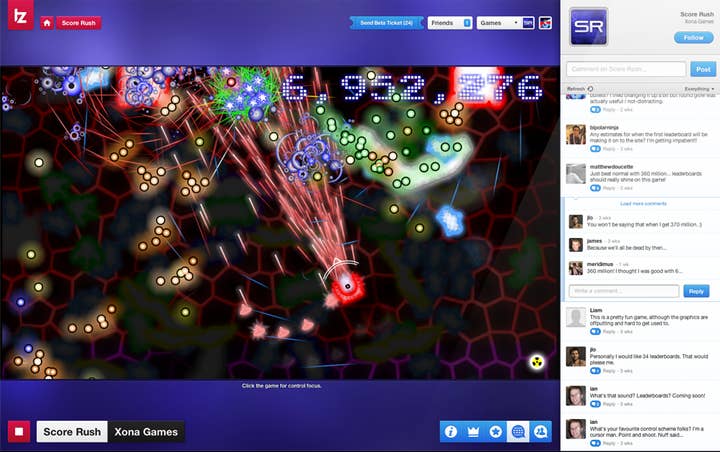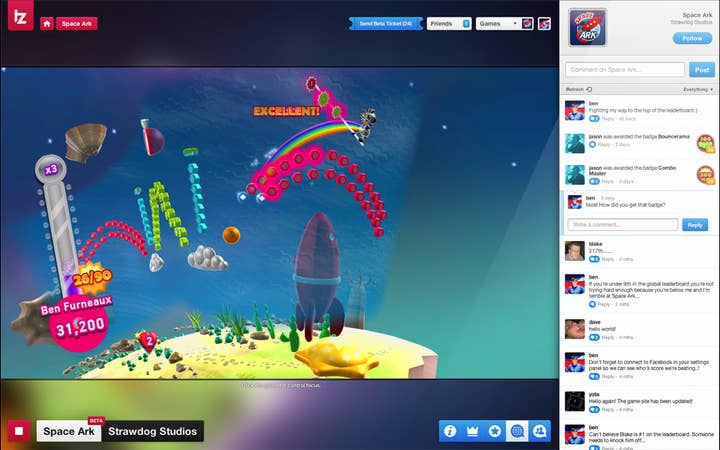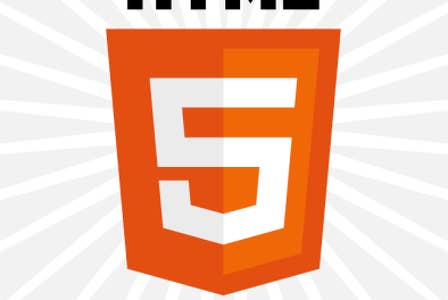The HTML5 Age Is Upon Us
In this guest editorial, Turbulenz CEO James Austin details what HTML5 means for games and what is possible with HTML5 today
Developers have been creating financially successful games with web technologies for many years: Travian was successful using static web pages and Farmville ploughed an entirely new furrow using Flash. But there is now a growing acceptance that HTML5 will be a major platform for games in the future. So why is HTML5 interesting, and is it really ready?
HTML5 is currently the ultimate Internet buzz word, so let's start by defining what it actually is. For me, HTML5 is basically two things: One, new HTML tags, most significantly for playing movies and audio; two, new programming interfaces that browser-hosted JavaScript applications can leverage. Basically, new features for programmers to use.
The second point is the relevant one for games. Any application that is written in JavaScript - the native language that runs within a web browser - that leverages the new HTML5 programming interfaces can be classed as an HTML5 game. But I would go further, because I think there is an expected level of fidelity for games. It's not enough to be a little gaming experiment, a spinning duck with some modern shading - we should be targeting games that match the fidelity and complexity possible on other modern platforms.

HTML5 is gradually allowing JavaScript applications to fully utilise all hardware available within a device. With that in mind, I think we can only seriously consider HTML5 games when they match the quality and fidelity possible via a native application on the same device. This time has come: just look at what StrawDog Studios achieved with Space Ark, or Xona Games achieved with Score Rush, both of whom used the Turbulenz HTML5 JavaScript SDK.
Why Is HTML5 Interesting?
Game developers will typically create content for platforms that have, or have the potential to attract, a large paying audience. When making an investment decision, developers take into account the size of the audience and the potential for that audience discovering, playing and ultimately paying for the game. To recoup their investment, developers need to get a game onto many devices to many consumers in an instantly accessible and simple way.
Portability
It's not enough to be a little gaming experiment, a spinning duck with some modern shading - we should be targeting games that match the fidelity possible on other modern platforms
A major perceived strength of an HTML5 game is its potential portability across devices that implement the HTML5 interfaces. Clearly, there are significant design challenges to making an application useable on a wide range of devices. The game would need to cleanly handle screens of different sizes and resolutions, with different user interfaces and wildly different performance, but the portability of JavaScript and HTML5 makes this possible. Of course, HTML5 isn't the first application platform that enables this - just think of Sun's 1995 release of Java to consider a 17 year old alternative. Nothing new indeed.
Reach
Another potential strength of the HTML5 platform is its sheer reach. Developers love the iOS platform because their game is not only accessible to a huge market, but most importantly it is rapidly accessible to a huge market. HTML5's reach has the potential to include all personal computers no matter the operating system: all mobile devices including Android and iOS, and any other smart Internet connected device such as the mythical Smart TV that may one day start gaining traction. All with just one click on a weblink. Perversely, it is the games consoles that are the least accessible devices when it comes to HTML5 content. But then again, why would the console manufacturers want to enable content that falls outside of their ecosystems?
Neutrality
The console manufacturers' control of their platforms leads us onto another strength of HTML5, namely its neutrality. HTML5 isn't owned or controlled by any single company. The first draft of HTML5 was created in 2004, and arguably the distributed nature of HTML5's development and growth have seriously slowed its progress. But this neutrality is exactly what will give HTML5 a life expectancy well beyond other conceptually similar owned platforms. The platform doesn't have a single vested interest, such as Adobe has with Flash; rather, it has a shared interest for companies building upon the internet as their platform.

Instant accessibility
The beauty of an HTML5 game is its instant accessibility and deployment. Installation and updates, which still challenge many non-technical users, are all handled by the application developers. The way an HTML5 game is delivered to users is highly efficient. The application is downloaded seamlessly by the browser whenever updates are made, and potentially huge content payloads are distributed on demand by the application. The starting process of an HTML5 game is a generational improvement over the already slick application model used on mobile devices and application stores today.
So it seems HTML5 is nothing special and nothing new. But when you take all of the little differences and strengths together - portability, reach, neutrality and instant accessibilityc - we have something with huge potential. And most importantly of all, there is a groundswell of developers and businesses investing in the platform for their future benefit.
Turbulenz is a free-to-play game network conceived and devoted to pushing the boundaries of HTML5 game in the future and most importantly today. To find out more click here, or attend the Turbulenz-sponsored HTML5 hackathon (gamehack.co.uk) on 28th-29th April.








